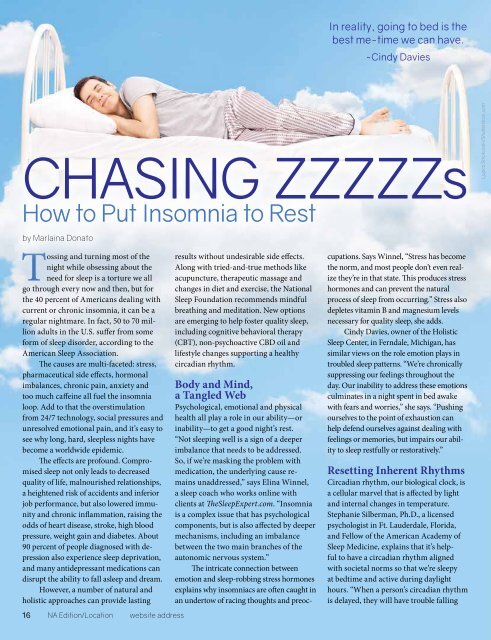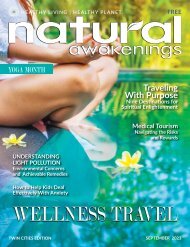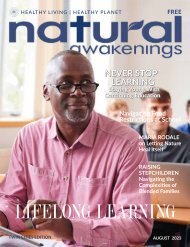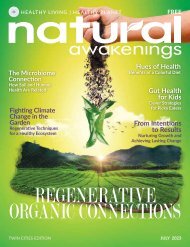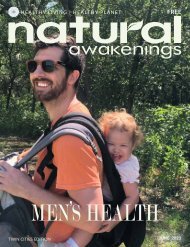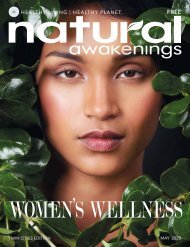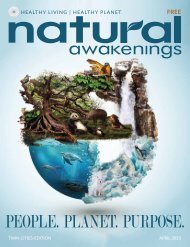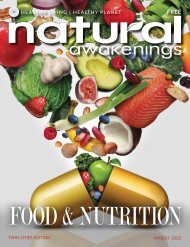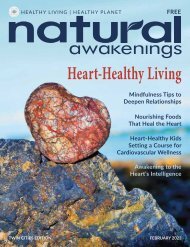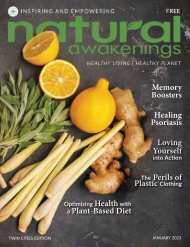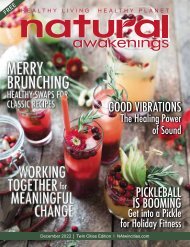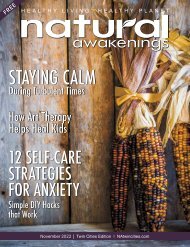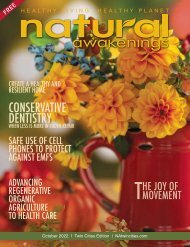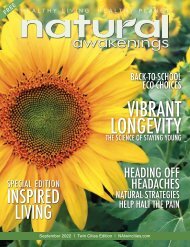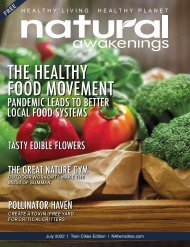Natural Awakenings Twin Cities November 2019
Natural Awakenings Twin Cities magazine is your source for healthy living, healthy planet information. Have you visited our website lately? Sign up for our Newsletter and Digital Magazine, read archived articles from local experts, and keep up with local healthy living events. Visit NATwinCities.com today. We provide a complete toolkit for businesses. List your healthy or green business for free. Enter your calendar events for free.
Natural Awakenings Twin Cities magazine is your source for healthy living, healthy planet information. Have you visited our website lately? Sign up for our Newsletter and Digital Magazine, read archived articles from local experts, and keep up with local healthy living events. Visit NATwinCities.com today.
We provide a complete toolkit for businesses. List your healthy or green business for free. Enter your calendar events for free.
You also want an ePaper? Increase the reach of your titles
YUMPU automatically turns print PDFs into web optimized ePapers that Google loves.
In reality, going to bed is the<br />
best me-time we can have.<br />
~Cindy Davies<br />
CHASING ZZZZZs<br />
How to Put Insomnia to Rest<br />
Ljupco Smokovski/Shutterstock.com<br />
by Marlaina Donato<br />
Tossing and turning most of the<br />
night while obsessing about the<br />
need for sleep is a torture we all<br />
go through every now and then, but for<br />
the 40 percent of Americans dealing with<br />
current or chronic insomnia, it can be a<br />
regular nightmare. In fact, 50 to 70 million<br />
adults in the U.S. suffer from some<br />
form of sleep disorder, according to the<br />
American Sleep Association.<br />
The causes are multi-faceted: stress,<br />
pharmaceutical side effects, hormonal<br />
imbalances, chronic pain, anxiety and<br />
too much caffeine all fuel the insomnia<br />
loop. Add to that the overstimulation<br />
from 24/7 technology, social pressures and<br />
unresolved emotional pain, and it’s easy to<br />
see why long, hard, sleepless nights have<br />
become a worldwide epidemic.<br />
The effects are profound. Compromised<br />
sleep not only leads to decreased<br />
quality of life, malnourished relationships,<br />
a heightened risk of accidents and inferior<br />
job performance, but also lowered immunity<br />
and chronic inflammation, raising the<br />
odds of heart disease, stroke, high blood<br />
pressure, weight gain and diabetes. About<br />
90 percent of people diagnosed with depression<br />
also experience sleep deprivation,<br />
and many antidepressant medications can<br />
disrupt the ability to fall asleep and dream.<br />
However, a number of natural and<br />
holistic approaches can provide lasting<br />
16 NA <strong>Twin</strong> Edition/Location <strong>Cities</strong> NAtwincities.com<br />
website address<br />
results without undesirable side effects.<br />
Along with tried-and-true methods like<br />
acupuncture, therapeutic massage and<br />
changes in diet and exercise, the National<br />
Sleep Foundation recommends mindful<br />
breathing and meditation. New options<br />
are emerging to help foster quality sleep,<br />
including cognitive behavioral therapy<br />
(CBT), non-psychoactive CBD oil and<br />
lifestyle changes supporting a healthy<br />
circadian rhythm.<br />
Body and Mind,<br />
a Tangled Web<br />
Psychological, emotional and physical<br />
health all play a role in our ability—or<br />
inability—to get a good night’s rest.<br />
“Not sleeping well is a sign of a deeper<br />
imbalance that needs to be addressed.<br />
So, if we’re masking the problem with<br />
medication, the underlying cause remains<br />
unaddressed,” says Elina Winnel,<br />
a sleep coach who works online with<br />
clients at TheSleepExpert.com. “Insomnia<br />
is a complex issue that has psychological<br />
components, but is also affected by deeper<br />
mechanisms, including an imbalance<br />
between the two main branches of the<br />
autonomic nervous system.”<br />
The intricate connection between<br />
emotion and sleep-robbing stress hormones<br />
explains why insomniacs are often caught in<br />
an undertow of racing thoughts and preoccupations.<br />
Says Winnel, “Stress has become<br />
the norm, and most people don’t even realize<br />
they’re in that state. This produces stress<br />
hormones and can prevent the natural<br />
process of sleep from occurring.” Stress also<br />
depletes vitamin B and magnesium levels<br />
necessary for quality sleep, she adds.<br />
Cindy Davies, owner of the Holistic<br />
Sleep Center, in Ferndale, Michigan, has<br />
similar views on the role emotion plays in<br />
troubled sleep patterns. “We’re chronically<br />
suppressing our feelings throughout the<br />
day. Our inability to address these emotions<br />
culminates in a night spent in bed awake<br />
with fears and worries,” she says. “Pushing<br />
ourselves to the point of exhaustion can<br />
help defend ourselves against dealing with<br />
feelings or memories, but impairs our ability<br />
to sleep restfully or restoratively.”<br />
Resetting Inherent Rhythms<br />
Circadian rhythm, our biological clock, is<br />
a cellular marvel that is affected by light<br />
and internal changes in temperature.<br />
Stephanie Silberman, Ph.D., a licensed<br />
psychologist in Ft. Lauderdale, Florida,<br />
and Fellow of the American Academy of<br />
Sleep Medicine, explains that it’s helpful<br />
to have a circadian rhythm aligned<br />
with societal norms so that we’re sleepy<br />
at bedtime and active during daylight<br />
hours. “When a person’s circadian rhythm<br />
is delayed, they will have trouble falling


